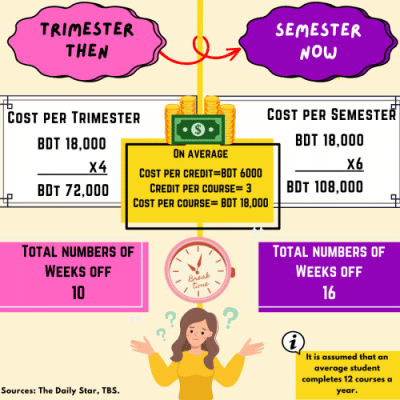Are private universities ready for a two-semester system?

The higher education system of Bangladesh has long been the subject of scrutiny, and while private universities have remained unscathed for the most part, the chaos that is brewing from shifting their trimester system to a semester system (or a two-semester system as it is being called) has thrust them into the spotlight.
In early 2022, the University Grants Commission (UGC) had asked all private universities of the country to implement two six-month semesters in a bid to make the study period uniform for all public and private institutions. Ideally, such a major structural shift in institutions involving tens of thousands of students should be planned extensively and implementation should come after sufficient notice so that current and prospective students alike can mentally prepare and plan their education effectively.
Unfortunately, the scenario here has been nothing but rushed and confusing.
At the time of writing this article, North South University (NSU) and American International University, Bangladesh (AIUB) have announced the new system, effective immediately from the upcoming Spring session. The respective calendars consist of about five months of classes and exams with one break lasting two weeks and another break lasting one and a half months in which students have the option to enrol in a shorter semester if they wish to do so.
Students we have interviewed from Independent University of Bangladesh (IUB) and BRAC University (BracU) have informed that they are yet to be subjected to the new system.
This begs the question, why are some institutions rushing to implement the two-semester system, consequently impacting thousands of students, while others are taking their time?

Professor Shamsad Mortuza is a Special Advisor to the Board at University of Liberal Arts, Bangladesh (ULAB). When asked about his institution's stance on this, he said, "Both trimesters and semesters are established international practices of dividing the academic calendar. Universities that offer semesters maintain a shorter summer term with longer teaching hours. I think universities should have the freedom to decide on their academic calendar. Previously UGC approved all university curricula in a trimester system. These curricula were vetted by UGC appointed overseas consultants under the Higher Education Quality Enhancement Project (HEQEP). The need to shift to semesters from trimesters is unclear. Logistically, it will require additional manpower and classrooms, and teachers will be expected to give more teaching hours per week. Also running two parallel systems for old students and incoming students will be cumbersome. This is an instance of micromanagement which will unnecessarily unsettle a settled issue. Focus should be given on the quality of teaching."
At the time of writing this article, ULAB is still following a four-month semester.
When asked a similar question, David Dowland, Registrar of BracU said, "Brac University welcomes the guidance to transfer to a two semester structure. Such a change requires significant planning and consultation. We shall move to a new campus within the next months as well. We shall work with students and faculty members to enable a smooth transition and to maintain our distinctive residential semester for undergraduate students."
"BracU is immediately adopting a two-semester structure for the School of Law. The School of Pharmacy already operates within two semesters. We are in discussion about the model to be adopted for other schools and to move effectively to a new structure," he added.
Private universities have historically provided respite from the notorious session jams found in their public counterparts, but under the new system, almost all current students, especially those nearing the end of their degree will be subjected to delays in their degree completion.
"It is honestly quite frustrating for those near the end of our degree. According to the previous system, I was set to graduate this April but now I have to wait an extra two months. It also doesn't help that we need to be doing internships by the end of all of this, more so because we still have not been informed of the exact details," said Nakib Sheikh Zaman, who is a final year BBA student at a private university.

Another student, Neera Sultana*, studying Architecture at AIUB, shared similar concerns, "Some courses, such as sub-studios, might not be offered during the optional semester which is only ten weeks long so the time frame is not sufficient for the course to achieve its objective or for us to finish the projects. Consequently, my plan of finishing my undergrads within five years may end up into taking around six years."
The situation is even more disheartening for those who were planning their higher studies abroad. Typically, universities abroad will expect students applying for their Master's degree to send in their application at least nine to ten months prior to the start of the graduate program. Under the new system students have to go through a longer waiting period before their applications can be sent out, thus missing their intended cohort.
While an academic year consisting of two halves has its merits, much of it depends on the structural implementation of it. Typically, around the world, universities conduct their academic activities over a period of four months and provide lengthy summer breaks to encourage research and internship activities. In the public universities of Bangladesh, the semesters span much longer, with two week breaks in between and a few weeks of preparatory leave incorporated into the semester.
"With a lengthier system, we expected to get reading weeks or preparatory leave before the midterms and finals as we will be taking more credits at a time," shared Tasin Tazdid, an engineering student at NSU. However, no such updates have been noticed in the announcement circulated by Tasin's university.
For some, the shorter semester break in between two lengthy semesters is a cause of disappointment.
"This came as a shock to me honestly, because even with trimesters we got a decent amount of break. Now because of the sudden change I am forced to drop this semester because of long standing travel plans and family engagements," lamented Tasin Tayeba Khan, a third-year student of NSU.
As many students work full time or live away from their hometowns, semester breaks are the only downtime they get and thus make plans keeping the academic calendar in mind.
The additional two or three courses that the average student will have to juggle under this system, will cause more problems than just time management inconveniences. For example, students of NSU have reported that non-tuition fees have increased by 1.5 times to make up for the lost term, and for students who are staying back to retake a few courses, this adds an extra financial burden on top of the already crippling anxiety of graduating late.
On the other hand, the longer duration holds the potential to be of some good for the student's academic life. For instance, the class duration will be shortened, giving students the much-needed break from the monotony of a 90-minute-long class.
Furthermore, the increase in the number of classes throughout the session will leave more room for a course to be taught more elaborately as they often should be. Oftentimes the momentum at which students begin to learn certain subjects is disrupted due to time constraints of a four-month semester. Capstone projects can also be completed with higher quality output as the longer duration will enable better research and more build time.
While not a lot can be said about the students' view on this, teachers seem hopeful so far.
Dr Tapash Kumar Paul, a senior lecturer at NSU had this to say regarding the implementation of the new academic semester, "I do expect that the introduction of the bi-semester will benefit both students and faculties. Students would be able to be more productive and focused and get time to acquire in-depth knowledge and understanding of a subject."
"UGC has made it mandatory for all private universities to start the new system from January this year. After a series of meetings, we have decided to implement it immediately," explained Ahmed Tazmeen, Registrar of North South University, when we reached out to him for his comment.
He also added, "We have kept a six-week break in between the semesters, which we are calling 'intersession'. Faculty members can use it for research and any other academic activities. Courses may or may not be offered during this time. We all are new to this so we are figuring out things as we go along."

Until the end of 2023, little can be said with actual certainty about the full impact of this change. However, there seems to be no turning back with the decision and so students must rely on making the right choices and having a good strategy. Taking the steps to establish what would be a good personalised course map and re-evaluating one's priorities will make all the difference.
*Names have been changed upon request

 For all latest news, follow The Daily Star's Google News channel.
For all latest news, follow The Daily Star's Google News channel. 








Comments